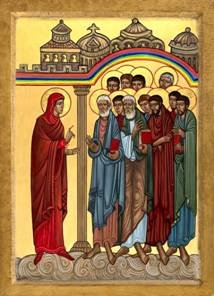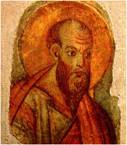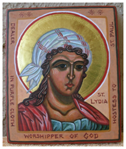Trinity – The Living God of Love
No matter what Christians profess to believe, if we are not living in relationships that serve the reign of God, then we don’t have a clue about who God is.

Trinity – The Living God of Love
No matter what Christians profess to believe, if we are not living in relationships that serve the reign of God, then we don’t have a clue about who God is.
 Different gateways into the one garden: Every era has its insights. Today, different theologies are glimpsing God again, not by deducing all there is to know – the Holy will never be available to us in this way – but by illuminating the presence of the divine mystery in our own times. Rather than discussing one aspect of the divine, each particular approach amplifies the meaning of the whole – like different gateways opening into the one garden.
Different gateways into the one garden: Every era has its insights. Today, different theologies are glimpsing God again, not by deducing all there is to know – the Holy will never be available to us in this way – but by illuminating the presence of the divine mystery in our own times. Rather than discussing one aspect of the divine, each particular approach amplifies the meaning of the whole – like different gateways opening into the one garden.
By listening to where the Spirit is moving in people’s lives today, by paying attention to others’ experiences, and interpreting them creatively in the light of biblical faith – and by calling for a universal practice of justice – these theologies shed new light on ways to know the divine. They also bring us hope.
The fact that voices from around the world – including many outside the centers of established power – are contributing to our understanding of God indicates the dawning of a truly global Christianity. So the quest goes on, and will continue to go on, as long as the unfathomable mystery of God calls human beings into the future. A beautiful soliloquy from Christopher Fry’s A Sleep of Prisoners speaks of this mystery:
The human heart can go to the lengths of God.
Dark and cold we may be, but this
Is no winter now. The frozen misery
Of centuries breaks, cracks, begins to move,
The thunder is the thunder of the floes,
The thaw, the flood, the upstart Spring.
Thank God our time is now when wrong
Comes up to face us everywhere,
Never to leave us till we take
The longest stride of soul men [and women] ever took.
Affairs are now soul size.
The enterprise
Is exploration into God.
Christopher Fry, A Sleep of Prisoners
Luke 23:33-43
Jesus is not alone on the cross. There are three men and three crosses – all surrounded by armed soldiers and a milling crowd. Some in the crowd watch in silence; but others shout like fans at a football game, inspired by their cheerleaders. In the uproar one of the dying men joins the crowd in shouting at Jesus, but the other man defends him and says, ‘Jesus, remember me when you come into your kingdom.’
What does it mean, to ‘remember’? There’s a difference between what the word meant to the people of the Scriptures, and what it means to us today. We think of a ‘memory’ as a thought we carry around in our own heads; and we think of ‘remembering’ as the process of searching our brains for things said and done yesterday or long ago. But for the Hebrews, memory was communal (shared by everyone through story-telling); and concrete (it was not a mere mental exercise, but restored a living relationship with the original people and activities).
Last February, Heaven is for Real – a book about a little boy’s near-death experience – reached #1 on the best-seller list. Proof of Heaven, a much more complex book written by a neurosurgeon, has sold more than two million copies since it was first published last year. These two books are not the only best-sellers about near-death experiences and the afterlife, because all of us are drawn to the perennial question: What happens to us when we die?
Mary Magdalene

Mary Magdalene proclaims the Resurrection
illumination from the Albani Psalter – Germany, 12th century
Who was I?
The Scriptures say I came from Magdala, a little village on the Sea of Galilee. They say I was one of the many who were healed by Jesus. They say that after my healing, I became one of the disciples who followed Jesus (and yes, the scriptures say women followed him, too). If you read the New Testament, you will see that we were respectable women, and some of us were wealthy; we helped provide for him as he traveled through Galilee and Judea.
* See John 20:19-31 Thomas: a traditional icon
Thomas: a traditional icon
My name is Thomas, and I’m a rational man. While some of you may go in for philosophies, or theologies, or visions, or dreams, I just want the facts.
John the Evangelist
Contemporary icon by William Hart McNichols
Who am I? Does it really matter who I am? I’m just another disciple – I began to follow him when I was still a boy, I grew up with him, I learned from him. He captured my heart and my imagination in a way that changed me forever.
Inspired by the Gospel of John, chapters 13-17
We were all there, you know. When John told the story, he spoke about Peter and Andrew, Thomas and Philip and all the others – even Judas was in the story – but he didn’t mention us. (Not that we expected to hear our names, that wasn’t the way it was done. The women were always there, but our names were never included.)
In Christ Jesus you are all children of God through faith. As many of you as were baptized into Christ have clothed yourselves with Christ… There is no longer Jew or Greek, there is no longer slave or free… There is no longer male and female, for all of you are one in Christ Jesus. (Galatians 3:26-28)
PAUL: I was a Jew, trained in the Torah and the traditions. I was on my way to Damascus, carrying letters from the rabbis of Jerusalem. When I got to Damascus, I was going to find the people who were stirring up the synagogues with talk about the Way of Jesus – and then drag them back to Jerusalem. But while I was still on the road, an intense light surrounded me and I heard a voice saying, “Saul, Saul, why are you persecuting me?”
I was knocked to the ground, and when my breath came back I called out, “Who are you, Lord?”
And the voice said, “I am Jesus, whom you are persecuting.”
My heart felt like it was stopping. Everything turned dark; I could no longer see anything. But then I heard the voice again, “Get up and enter the city, and you will be told what to do.”
And from then on, his Spirit never left me. How can I describe it so it makes sense to you? His Spirit guides me – and scolds me; it comforts me – and it goads me. Wherever I go, it keeps me on the Way of Jesus.
In those days, wherever I went, there were so many people who met Jesus through his Spirit. In every town and city, every synagogue and marketplace, they were there – people who came to know him as I did, through the same Spirit who spoke to me.
That’s how I met Lydia. I was again on the road, this time in Asia Minor (today you would know it as western Turkey). We were visiting some of the little churches there, and we planned to keep going north to the Black Sea. But just when we were about to start out, the Spirit stopped us; so we waited. And that night, I had a dream, and in that dream a man stood pleading with me, saying, “Come over to Macedonia and help us.” And the next day we found a boat to take us west, across the sea to Macedonia, and we anchored in Philippi.
There were so few Jews in Philippi that there wasn’t a synagogue. But there were a few Jewish women there, and some Gentile women as well, who believed in the Jewish God. We found them beside the river outside the city, where they met for worship every Sabbath. When their prayers were finished, we began to talk with them, and that’s when I first met Lydia.
I could see, from her clothes, that she was a wealthy woman; and I could see, from the way the other women listened to her, that they respected her. And I could see that she was eager to hear more about the Living God, and about the Way of Jesus. That very afternoon she asked to be baptized, and she became a follower of Jesus.
But she was more than a follower – she became my partner in the Lord’s work in Philippi. You’d think we wouldn’t have much in common. I was wandering from town to town, sometimes mending tents to have enough to eat; she was wealthy from her trade in purple cloth, and the head of a large household. And yet. And yet, we became partners in the Spirit’s work.
LYDIA: I was a Gentile, and a seller of purple cloth. When my husband died, I took over his business. Well, really we had run the business together, and when he was gone I just continued on. We had been very successful in Asia (purple cloth then was like the most expensive cashmere today). Our business grew as we traded in cities farther east in Asia and with cities in Macedonia. Finally, I decided to move my headquarters to Philippi, to be on the great trade road from Rome to the east.
But the business and the money weren’t enough for me. The ways of the old gods, the gods of my parents, seemed useless – even dead – to me; and I began to look for more. It was while we still lived in Asia that I met the Jewish women who brought me to sit with them in their synagogue.
The God of the Jews! The God of the Torah and the Psalms – this was the God I was looking for! This was the God who began to guide my life.
When we moved to Philippi, I looked for Jews there. There weren’t enough men to form a synagogue – you know the rule, ten men are needed for worship – but there were plenty of women to pray together, to sing together, to study Torah together. And so we Gentiles, women and a few men, joined the Jewish women.
That Sabbath we were by the river when Paul and his friends appeared. Paul told us the story of Jesus, the man he called the Son of God, the man who was filled with the Spirit of God – indeed, the man that the Spirit had raised from the dead. And Paul said to us, quoting from the prophet Isaiah, I have set you to be a light for the Gentiles, so that you may bring salvation to the ends of the earth.
The prophet’s message was for us! God’s life was for us, too! I was filled with joy and asked to be baptized. In fact, those in my household – my family and servants – wanted baptism, too. And in my joy after the baptisms, I asked Paul and his companions to come back to my home – to make my home his headquarters, for the work he was to do in Philippi.
And Paul stayed in my home for weeks, and the group meeting in my home grew and grew. They came to hear the stories of Jesus, to search the Scriptures together; they came to be baptized in the atrium pool; and they came to share the Lord’s body and blood around my table. My own table became the table of the Lord where all came to share – the Jews and the Gentiles, the rich and the poor, the slaves and the free. The Spirit of Jesus drew us together, bound us together, taught us together.
The first time Jews and Gentiles ate together, we were really nervous. Could the Spirit really be saying it was all right to eat without following all the kosher rules? And the first time the servants shared the Eucharist with us, it was strained. Could the Spirit really be gathering the poor, the dirty, the menial laborers, to the same table as the rich, the clean, and the educated?
 PAUL: But time after time the Spirit pointed the way forward. Over those months of praying together, and listening together, and working together, the Spirit shaped us a into a community.
PAUL: But time after time the Spirit pointed the way forward. Over those months of praying together, and listening together, and working together, the Spirit shaped us a into a community.
 LYDIA: This was the community, the little church, that found a home in my house. And when the time came for Paul to leave us, to go on to other churches, we were sad to lose him. But the Spirit was still with us, holding us together and helping us grow. Paul went on, but Jesus’ Spirit never left us.
LYDIA: This was the community, the little church, that found a home in my house. And when the time came for Paul to leave us, to go on to other churches, we were sad to lose him. But the Spirit was still with us, holding us together and helping us grow. Paul went on, but Jesus’ Spirit never left us.
 PAUL: They say I didn’t like women… that I wanted them to keep their heads covered…that I wanted them to keep their mouths shut…. that I wanted them to sit quietly in the background. They’ve forgotten, if they ever knew, about Lydia and all the other women who were my partners in the Lord.
PAUL: They say I didn’t like women… that I wanted them to keep their heads covered…that I wanted them to keep their mouths shut…. that I wanted them to sit quietly in the background. They’ve forgotten, if they ever knew, about Lydia and all the other women who were my partners in the Lord.
 LYDIA: Yes, Paul needed to be in charge. And he definitely didn’t like it when those women in Corinth wouldn’t stop talking to each other during the Eucharist. And there were many times when he was so exasperated with people – women and men – he just lost his temper, but –
LYDIA: Yes, Paul needed to be in charge. And he definitely didn’t like it when those women in Corinth wouldn’t stop talking to each other during the Eucharist. And there were many times when he was so exasperated with people – women and men – he just lost his temper, but –
 PAUL: That’s why I got thrown into jail in Philippi, after all – I just lost my temper with that slave girl who kept yelling at me in the market! There’s a reason I told the Corinthians that love is patient and kind, that love is not irritable. The Spirit has really had to work hard to keep me in control!
PAUL: That’s why I got thrown into jail in Philippi, after all – I just lost my temper with that slave girl who kept yelling at me in the market! There’s a reason I told the Corinthians that love is patient and kind, that love is not irritable. The Spirit has really had to work hard to keep me in control!
 LYDIA: But Paul saw that women were bringing their own gifts to the community. He saw that I could run a large household along with a growing business, and he saw that the Spirit had also given me the gift of hospitality. And so at Philippi, we worked together; and when Paul went on to other cities, our church in Philippi – men and women working together – kept on growing in the Spirit.
LYDIA: But Paul saw that women were bringing their own gifts to the community. He saw that I could run a large household along with a growing business, and he saw that the Spirit had also given me the gift of hospitality. And so at Philippi, we worked together; and when Paul went on to other cities, our church in Philippi – men and women working together – kept on growing in the Spirit.
 PAUL: Lydia was one of the many women who showed me how the Spirit creates a church. The Spirit sends many gifts – gifts of leadership and hospitality as well as preaching and teaching. The Spirit takes everyone – men and women, Jews and Gentiles, rich and poor – to form a community. And that’s what happened in Philippi. It was there that the Spirit led us to the truth, again and again:
PAUL: Lydia was one of the many women who showed me how the Spirit creates a church. The Spirit sends many gifts – gifts of leadership and hospitality as well as preaching and teaching. The Spirit takes everyone – men and women, Jews and Gentiles, rich and poor – to form a community. And that’s what happened in Philippi. It was there that the Spirit led us to the truth, again and again:
In Christ Jesus you are all children of God through faith. As many of you as were baptized into Christ have clothed yourselves with Christ… There is no longer Jew or Greek, there is no longer slave or free… There is no longer male and female, for all of you are one in Christ Jesus. *
* from Galatians 3:26-28
(Paul wrote these words to the Galatians a few years after his visit to Philippi.)
For more about Paul and Lydia, and the church in Philippi, go to
Acts, Chapter 16
Paul’s Letter to the Philippians, Chapters 1-4